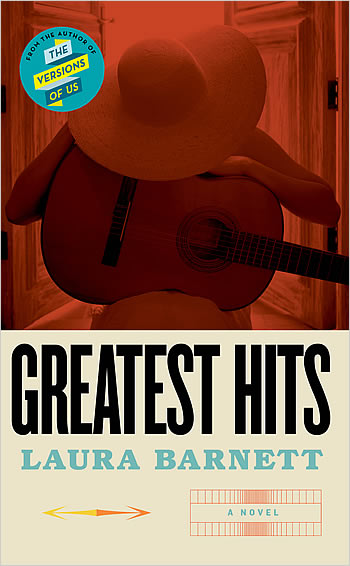Carolyn Percy reviews Laura Barnett’s Greatest Hits, which follows the story of a folk-rock musician rediscovering herself through old tracks.
Cass Wheeler: famous singer-songwriter; daughter; wife; mother. For the past decade, she’s isolated herself from both music and the outside world. But now she’s ending her silence by releasing a Greatest Hits album; a Greatest Hits album with a uniquely personal twist: over the course of one day, she will journey through her music, picking the sixteen tracks that have defined her the most. But will this journey bring catharsis or more strife?
 Laura Barnett’s bestselling debut novel, The Versions of Us, was a beautifully & intelligently written Sliding Doors-esque story about individual choices and the road not taken. Greatest Hits has a more linear structure but is just as moving and well written. The novel is structured like an album: each chapter is a different track, chronicling an important period in her life, prefaced by one of Cass’s songs which provide clues to the chapter’s subject matter.
Laura Barnett’s bestselling debut novel, The Versions of Us, was a beautifully & intelligently written Sliding Doors-esque story about individual choices and the road not taken. Greatest Hits has a more linear structure but is just as moving and well written. The novel is structured like an album: each chapter is a different track, chronicling an important period in her life, prefaced by one of Cass’s songs which provide clues to the chapter’s subject matter.
Sandwiched between these is the present-day narrative thread which, in a homage to Mrs Dalloway, covers the entire day, hour by hour, culminating in a party to celebrate Cass’s return to music and, in a way, to life. Encompassing themes such as personal identity through art, the changing music industry, rivalry in creative couples, mother-daughter relationships, and the question of whether you can be an artist and a parent, Barnett has created a wonderful portrait in Greatest Hits, not only of a changing industry & profession, but of a person. Cass is the beating heart, thinking brain and feeling soul of this novel.
Cass’s love of music begins in early childhood, one of her few sources of solace in the difficult relationship with her mother; a relationship characterised by Cass’s desperation for her mother’s love, praise and attention but never quite sure how to earn it and her mother not even certain she’s able to give it. This develops into a passion for songwriting as a teenager, after she’s gifted her first guitar and her aunt introduces her to her beloved folk records, building upon Cass’s love of narrative pop/rock n’ roll. Then, in one of those moments that turn out to be so pivotal that, in hindsight, it’s almost as if it were fated, Cass meets Ivor Tate: the man who will become her muse; lover; collaborator and, later, husband.
Cass becomes Cass Wheeler the folk-rock musician, blowing onto the stage and music scene like a breeze that continues to gather speed. But partnerships where both are ambitious and talented are never easy, and as Cass and Ivor’s relationship grows ever more fraught – compounded when Cass gives birth to their daughter, Anna; as much as Cass loves her, the question of whether motherhood can exist alongside her identity as an artist, as well as the spectre of her failed relationship with her own mother, loom large.
Like a lot of teenagers in the 1960s, Cass is a fan of the Beatles, and they – along with Kate Bush and a few modern singer/songwriters whose songs are largely storytelling in style – are what Cass’s songs most remind me of: they take inspiration from the everyday as well as the deeply personal – or the personal in the everyday – and weave them into stories that happen to be set to melodies that, whether fast or slow, manage to be both haunting and catchy. Because, like Cass & Ivor, this novel is also a collaboration: between Laura Barnett and the Mercury Music award nominated singer/song writer Kathryn Williams. The songs that preface each chapter are the result of a writing process between them, Barnett providing the original, embryonic lyrics which Williams has then polished and recorded. The recorded songs comprise an accompanying album, also named Greatest Hits. Book and album are wonderful on their own but complement each other when combined.










